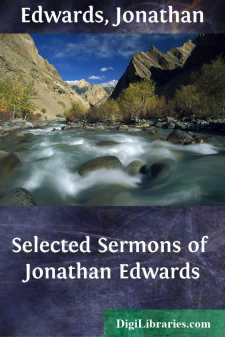Categories
- Antiques & Collectibles 13
- Architecture 36
- Art 48
- Bibles 22
- Biography & Autobiography 813
- Body, Mind & Spirit 142
- Business & Economics 28
- Children's Books 17
- Children's Fiction 14
- Computers 4
- Cooking 94
- Crafts & Hobbies 4
- Drama 346
- Education 46
- Family & Relationships 57
- Fiction 11829
- Games 19
- Gardening 17
- Health & Fitness 34
- History 1377
- House & Home 1
- Humor 147
- Juvenile Fiction 1873
- Juvenile Nonfiction 202
- Language Arts & Disciplines 88
- Law 16
- Literary Collections 686
- Literary Criticism 179
- Mathematics 13
- Medical 41
- Music 40
- Nature 179
- Non-Classifiable 1768
- Performing Arts 7
- Periodicals 1453
- Philosophy 64
- Photography 2
- Poetry 896
- Political Science 203
- Psychology 42
- Reference 154
- Religion 513
- Science 126
- Self-Help 84
- Social Science 81
- Sports & Recreation 34
- Study Aids 3
- Technology & Engineering 59
- Transportation 23
- Travel 463
- True Crime 29
Selected Sermons of Jonathan Edwards
by: Jonathan Edwards
Description:
Excerpt
INTRODUCTION
Jonathan Edwards was born October 5, 1703, in what is now South Windsor, Conn., a part of the parish then known as âWindsor Farmes.â His father, the Rev. Timothy Edwards, the minister of the parish, a Harvard graduate, was reputed a man of superior ability and polished manners, a lover of learning as well as of religion; in addition to his pastoral duties, he fitted young men for college, and his liberal views of education appear in the fact that he made his daughters pursue the same studies these youths did. His mother, a daughter of the Rev. Solomon Stoddard, the minister of Northampton, is said to have resembled her distinguished father in strength of character and to have surpassed her husband in the native vigor of her mind. As regards remoter ancestry and their intellectual and moral qualities, Edwards seems also to have been well born; an exception, however, must be made of the eccentric and possibly insane grandmother on his fatherâs side, whose outrageous conduct led to her divorce.
Brought up the only son in a family of ten daughters, apart from all distracting influences, in an atmosphere of religion and serious study in the home, amid natural surroundings of meadows, woods, and low-lying distant hills singularly conducive to a life of contemplation, the boy early developed that absorbing interest in the things of the spirit, and that astonishing acuteness of intellect which are the most prominent characteristics of his genius. While a mere child he spent much of his time in religious exercises and in conversation on religious matters with other boys, with some of whom he joined to build a booth in a retired spot in a swamp for secret prayer; he had besides several other such places for prayer in the woods to which he was wont to retire. His mind also dwelt much on the doctrines he was taught, especially on the doctrine of Godâs sovereignty in election, against which he at that time violently rebelled. When only ten years of age he wrote a short, quaint, somewhat humorous little tract on the immortality of the soul; at about twelve he composed a remarkably accurate and ingenious paper on the habits of the âflying spider.â
He entered the Collegiate School of Connecticut at Saybrookâafterwards Yale Collegeâat thirteen, and in 1720, shortly before his seventeenth birthday, graduated at New Haven with the valedictory. In his Sophomore year he made the acquaintance of Lockeâs Essay on the Human Understandingâa work which left a permanent impress on his thinking. He read it, he says, with a far higher pleasure âthan the most greedy miser finds when gathering up handfuls of silver and gold from some newly-discovered treasure.â Under its influence he began a series of Notes on the Mind, with a view to a comprehensive treatise on mental philosophy. He also began, possibly somewhat later, a series of Notes on Natural Science, with reference to a similar work on natural philosophy. It is in these early writings that we find the outlines of an idealistic theory which resembles, but was probably not at all derived from, that of Berkeley, and which seems to have remained a determining factor in his speculations to the last.
After graduating he continued to reside for two years in New Haven, studying for the ministry....


